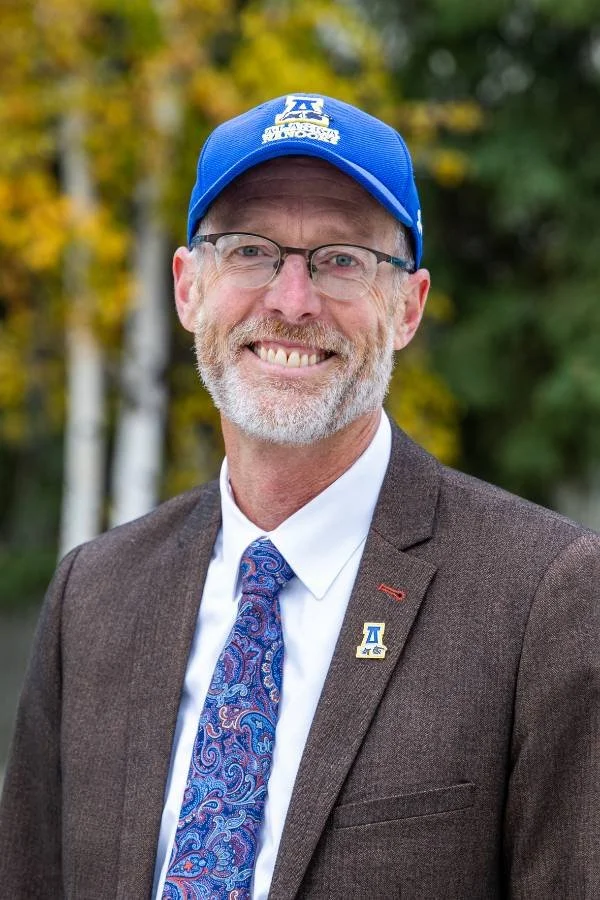UAF Chancellor Latest UA Leader to Leave
By Lizzy Hahn
Photo courtesy of the University of Alaska Fairbanks
UAF Chancellor Dan White
University of Alaska Fairbanks Chancellor Daniel White announced he will be retiring from his position as Chancellor, with his last day being July 26, 2026. White is the third member within the University of Alaska administration to announce his retirement; the first two were University of Alaska Anchorage Chancellor Sean Parnell and UAF Provost Anupma Prakash.
UA president Pat Pitney announced White’s retirement to the UA community on May 30, in an email recognizing White for his “wealth of knowledge and experience” that “has made him an incredible leader for UAF.”
White started his career at UAF as a professor of civil and environmental engineering. White has worked for the University of Alaska for 30 years, serving as UAF’s chancellor since 2017.
“We're entering some uncertainty here, but I think this is a time when the university has growing enrollment, we have a lot of community support,” said White, in reference to his retirement, in an interview. He claimed that this was a good time to transition since the university is on an upward trajectory, despite the fact UAF has yet to attain R-1 research designation which has been the focus of much of White’s tenure in leadership.
Looking at the recent trend of changes within the UA administration, White thought that these changes indicate a logical time for change that many institutions undergo.
“You’re seeing this across the country… institutions are changing and pivoting, and as part of that high level administrators are looking at it and saying, ‘Yeah, this is a good time for me,’” said White.
White said he felt comfortable leaving now because of the “strong group of leaders,” specifically the five vice chancellors who work under the chancellor at UAF. Pat Pitney will ultimately choose White’s replacement.
Charlene Stern, who was the vice chancellor for Rural, Community and Native Education, will serve as interim provost while UAF conducts their nationwide search for a new provost.
Amidst times where federal funding is uncertain, White said that UAF has had some grants canceled, but these were a “very small percentage of the portfolio.”
White had a very optimistic outlook on the current challenges surrounding federal funding, stating that the new question for UAF is “what are the opportunities.” White referenced UAF’s long history of working with space agencies and environmental change agencies, like the National Science Foundation and Department of Defense.
The National Science Foundation has recently been terminating grants that are “not aligned with program goals or agency priorities… including but not limited to those on diversity, equity, and inclusion (DEI), environmental justice, and misinformation/disinformation.”
Over 1,600 NSF grants have been terminated, totalling over $1.5 billion in funding.
“UAF has a lot of skills to offer in areas that we think are going to be growth areas like critical and rare earth minerals, space and space physics, Arctic security and Arctic awareness, and situational awareness and defense,” said White. He expects there to be growth in each of these areas. He also hopes to “position the institution to best serve those research needs, but also educational needs.”
“We're seeing more and more students from outside of Alaska choosing UAF,” said White. “We always say we train Alaskans and future Alaskans.”
But in order to train future Alaskans, UAF is aiming to increase its current on campus housing availability. According to White, “if every single bed at UAF was full, between 13% and 16% of students” would be housed. He pointed out that many other institutions can house between 30% and up to 80% of their students.
“The last residence hall that was built here was built 56 years ago,” said White. This residence hall is the Moore-Bartlett-Skarland Complex that was recently renovated in 2024.
“Housing is a real critical need,” said White.
When asked what a highlight of his time at UAF was, White mentioned the 14 straight Governors Cups that the UAF hockey team won against UAA. He then pivoted by referencing the budget cuts that have affected the university over the past few years.
“There was a lot of soul searching and questions about what could we and should we afford,” said White. To White, athletic programs are important to maintain connections with the community, alumni of the university and are an important source of pride for current students.
White then pointed out that UAF’s enrollment has been increasing for the past few years. This comes at a time when enrollment is down in local high schools.
“Demographically, there's just fewer people going to college across the country,” said White. “Alaska has a decrease in college age… people.” According to the State of Alaska, UAF’s enrollment increased by 10.7% from fall 2019 to fall 2023. The State of Alaska also showed that graduation rates in Fairbanks dropped 6.6% from 2019 to 2023.
Looking forward to his life after retirement from his position as chancellor, White said that he hopes to go moose hunting. Typically, moose season has fallen during the same time as the Board of Regents meetings at the end of August.
“I am very much looking forward to enjoying a lot of the Alaska outdoors,” said White.


